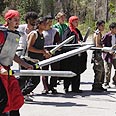

“They're detached from reality and suscepitble to influence,” the army says.
Fans of the popular roleplaying game had spoken of rumors of this strange policy by the IDF, but now the army has confirmed that it has a negative image of teens who play the game and labels them as problematic in regard to their draft status.
So if you like fantasy games, go see the military psychologist.
Dungeons and Dragons (also known as D&D) has been a popular roleplaying game for decades and is based on a fantasy world.
One player assumes the role of “Dungeon Master,” which entails directing the game and controlling the labyrinth, while the others select from a large selection of characters that includes warriors, magicians, dwarfs and thieves.
The game focuses on the results of decisions
made by the players as determined by the roll of the dice.
In a more "active" version of the game, players leave the table and go out, dressed as the characters they assume for the game, along with the requisite equipment of swords (not real) to play outside, usually in the forest or woods. Most D&D players do not don costumes, and participants in such costume games are called "LARPers" (for live-action role playing).
'Simply detached from reality'
Thousands of youth and teens in Israel play D&D, fighting dragons and demons using their rich imaginations. The game has also increased in popularity due to the "Lord of the Rings" trilogy.
However the IDF does not approve of this unusual hobby and prevents D&D players from being considered for sensitive army positions by labeling them with low security clearance.
"We have discovered that some of them are simply detached from reality," a security source told Ynet.
Game enthusiasts are aware of their problematic image in the army and prefer to maintain their anonymity. Many of them are from the former Soviet Union, where the game is very popular.
In Israel there are thousands of players, between the ages 16 to 35, and include lawyers, high-tech workers and businessmen. Matan, 22, and Igor, a 21-year-old IDF soldier, organize activities for groups of players. Soon hundreds of fans are expected to meet in a forest in the southern part of Israel for a two-day game of pure fantasy.
"It's not a game of winners and losers," Matan says, "but rather entry into another world with stories and plot changes."
He is aware of the game's problematic reputation, especially in the IDF. The army is not indifferent to the unique hobby and is trying to locate soldiers who in their free time dress up as witches and play in forests.
'The game indicates a weak personality'
A security official tells Ynet there are specific criteria for deciding the level of a soldier's security clearance.
"One of the tests we do, either by asking soldiers directly or through information provided us, is to ask whether they take part in the game," he says. "If a soldier answers in the affirmative, he is sent to a professional for an evaluation, usually a psychologist."
More than half of the soldiers sent for evaluation receive low security clearances, thus preventing them from serving in sensitive IDF positions, he says.
Igor says exposing soldiers who play the game could result in the soldiers being sent to a military psychologist or even being kicked out of the army.
"Exposing them could also harm their chances at being accepted to other military courses," he says.
Matan says he has personally met soldiers whose military career was harmed due to their connection to the game. Most soldiers who play Dungeons and Dragons simply do not admit to it while they are in the army, he says.
Why does IDF believe game is dangerous?
"These people have a tendency to be influenced by external factors which could cloud their judgment, a military official says. "They may be detached from reality or have a weak personality - elements which lower a person's security clearance, allowing them to serve in the army, but not in sensitive positions."
Unsurprisingly, Igor, Matan and thier friends do not approve of this IDF policy. They say the game is only a colorful, non-violent hobby.
"Many people who play served in the most classified units," David says. "They are intelligent and any attempt to label them as 'weird' is incorrect and unfair."
But in the struggle between the gameplayers and the Defense Minister, the latter wins - or at least this is the case in the real world of the IDF.















